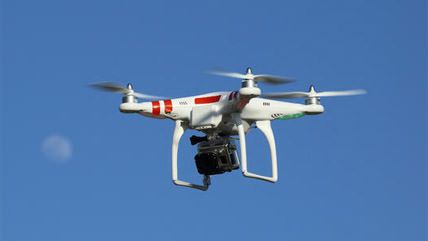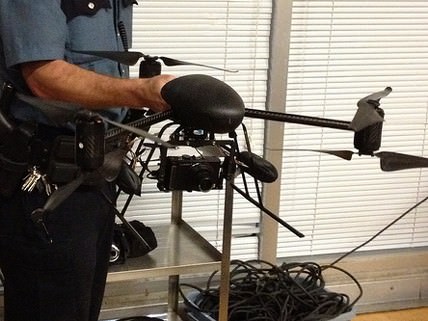Drone-Flown Package Deliveries Arrive! …in Germany. C'mon, America!


The express mail service DHL is scheduled to use a drone, dubbed the "parcelcopter," to deliver some packages of medicine today. If the company does so successfully, it will be a step ahead of giants like Amazon and Google, which have generated much buzz around their projected drone delivery plans.
Unfortunately, the U.S. is out of the loop in this exciting new field. DHL's test is taking place in Germany, transporting the goods to a remote island called Juist.
From The New York Times:
DHL said that it had worked with the German air-traffic agency and the country's Ministry of Transport and Digital Infrastructure to create a restricted flight zone for the company's drone project. The aircraft will hover 100 feet off the ground and reach speeds of up to 40 mph during the seven-mile journey from the mainland to Juist.
Amazon and Google are conducting tests, but not actual deliveries. Even though they're American-based companies, those trial runs are happening in Canada and Australia, respectively.
The Federal Aviation Administration (FAA) is weighing down the industry in The Land of the Free.
Seemingly good news in the U.S. that the FAA is now allowing half a dozen Hollywood film companies to fly drones is soured by how much the administration abuses hobbyists and small businesses. There's a growing litany of airborne operations shut down by the FAA: taco deliveries, crop dusters, wedding photographers, and even a charitable search and rescue team. I've previously highlighted that even Russia has drone pizza delivery services, something prohibited in the U.S.
But the agency isn't just playing favorites with certain sectors, it's flatout inept and shortsighted.
Even though the worldwide drone industry is projected to be worth $89 billion over the next 10 years, the administration even shut down a college program geared at educating the first wave of America's drone-related workforce.
The FAA has been issuing cease-and-desist orders, which courts have determined lack legal weight, but they're still effective at scary off potential business builders.
The agency has approved several drone testing sites throughout the U.S., but as of yesterday, they're still not telling testers what the heck they're allowed and supposed to be doing, reports Vice's Jason Koebler.
Even the Department of Transportation Inspector General has little faith in the agency. He reported in June that the FAA "is significantly behind schedule in meeting most of the [drone]-related provisions of the [2012] FAA Modernization and Reform Act." In less than a year, the FAA is supposed to have "aircraft certification requirements, standard air traffic procedures, [and] an adequate controller training program" hammered out, but they haven't made much progress yet.
Editor's Note: As of February 29, 2024, commenting privileges on reason.com posts are limited to Reason Plus subscribers. Past commenters are grandfathered in for a temporary period. Subscribe here to preserve your ability to comment. Your Reason Plus subscription also gives you an ad-free version of reason.com, along with full access to the digital edition and archives of Reason magazine. We request that comments be civil and on-topic. We do not moderate or assume any responsibility for comments, which are owned by the readers who post them. Comments do not represent the views of reason.com or Reason Foundation. We reserve the right to delete any comment and ban commenters for any reason at any time. Comments may only be edited within 5 minutes of posting. Report abuses.
Please to post comments


OT: Oklahoma Woman Beheaded By Man Who Tried to 'Convert Co-Workers to Islam'
http://www.breitbart.com/Big-G.....-co-worker
It's not terrorism, it's workplace violence. Nothing to see here.
Yeah, PC bastards will probably try to cover up a nutjob going on a murder spree at his workplace immediately after getting fired as "workplace violence". Like we really believe that.
It's not terrorism, it's workplace violence. Nothing to see here.
Could go either way;
Everything to see here! Home-grown active beheaders on the rise!
Apple wants to see more women beheaded by men using encrypted phones.
Fuck Breitbart and autoplay.
That which is not permitted is forbidden.
Seriously? The German test was done in a tiny restricted area with little air traffic over open ocean. Try to fly a drone anywhere else in the Reich and their version of the FAA will smack you down as hard or harder than the FAA does here.
Take your anti-American animus elsewhere, Zenon.
Fight on, brave defender of American bureaucracy!
If not us, then who? Whom? Hmm, still sounds right.
You can't trust Whom. That guy's a slacker.
Maybe you should move to Germany if you prefer their aviation authority so much.
At least they know how to party on a plane over there.
If you don't like Murica you can geeet out.
Oh yeah? Well if you like [fill in the blank] so much, why don't you marry it? Ha!
And Germany is the source of much of the progressive agenda in the US, and has been for more than a century. That's where public education, the welfare state, mandatory health care, and anti-free market regulation and ideologies come from. It's no accident that Marx and Hitler both were German, and much of the modern left traces its roots to the ideology of the Frankfurt school.
So, yeah, the German version of the FAA will smack you down, just like the American version of the German version of the FAA.
You know who else had things rain down from above?
Rained down by Germans?
No doubt some loser with say Fat Joe & Lil Wayne.
Pssh, yeah, so obvious.
Billy Idol?
Curtis LeMay?
Fat Joe & Lil Wayne?
Threading is hard.
is anyone else as tired of Youtube's increasing reliance on unskippable ads as I am?
I didn't get an ad, straight to the hoes.
I hear chrome's adblocker will actually take care of those. Maybe I'll get off my ass and set it up.
I use a flash blocker and html5 extension, never see ads, even the skippable ones.
Germany, transporting the goods to a remote island called Juist.
I bet they're all Juist up about the possibilities!
That's the best you could sink of?
Yawol!
But the agency isn't just playing favorites with certain sectors, it's flatout inept and shortsighted.
I'm not sure 'inept' makes much sense anymore. I don't think these agencies are trying to 'ept' or 'inept', I think they're trying to preserve their authority. And what better way to preserve authority than to be The One That Decides. Who cares what the Decision is, as long as they have exclusive authority to make said Decision.
Or in this case to keep on not making the decisions.
Shutting down a search and rescue team? Really? They must not have been looking for anyone "important."
If people run their own search and rescue, what's in it for the government?
Exactly.
Drone Gap!
Which brave politico will take up the cudgel and address this major issue of our time?
Jooo-ist? Is this some Zionist plot?
At least in Germany the drones run on time.
I hope people realize that when the FAA classifies drones as "commercial air traffic", you lose any right to interfere with them or ability to take legal steps against them. Whatever the FAA considers "navigable airspace" over your private property is fair game for any commercial drone operator. As past problems involving helicopters have shown, you have no legal recourse, no matter how disruptive and noisy they get. The courts say "it's commercial airspace, the FAA regulates it" and the FAA says that they don't have the authority to limit use of navigable airspace in any way. You can't even build fences or nets to keep them out, that's a violation of law.
The source of the problem is the vague and poorly written language establishing the authority of the FAA in the first place. It doesn't place any well-defined boundary between private property and public airspace, and it doesn't really allow the FAA to limit the use of public airspace beyond safety concerns. Until the laws establishing the FAA get fixed to achieve a reasonable balance between property rights and public airspace, instead of the ill defined mess we have now, it's unclear that allowing commercial drone use is a good idea.